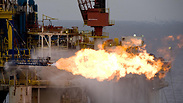
Natural gas
Photo: Albatros
Permanently anchored in the choppy waters of the eastern Mediterranean, the gas tanker Excellence is in a constant state of alert, waiting for the phone call that Israel
needs fuel.
The only country in the world to rely on a boat for its emergency energy supplies, the unconventional system proved its worth last month when a rare snowstorm swept Israel, leading technicians to call in for help to meet the surging demand.
The gas, imported and stored on-board in liquid form, was "degasified" and pumped through a special buoy into an underwater pipeline. In less than an hour, the Israel Electric Corp (IEC) had received its badly needed boost.
Israel is near a tipping point. Sometime in the next year or so, gas will surpass coal to become the main fuel for electricity production, a shift made possible by the discovery of huge offshore natural gas fields.
The buoy was completed a year ago for about 500 million shekels ($143 million). Separate from the exploration network, it offers a back-up in case of a spike in demand or any mishap in the single pipeline connecting the Israeli fields to shore.
A few other deep sea buoys have been built elsewhere in the world, but none are in use, officials said. Usually multi-billion dollar piers and land-based facilities are constructed to receive the liquefied natural gas (LNG).
But when militants in Egypt's Sinai peninsula blew up a cross-border gas pipeline in 2011, Israel in an instant lost vital supplies. IEC was forced to burn more expensive diesel and fuel oil and the company's already onerous debt ballooned to 70 billion shekels.
"We needed to find a creative solution that ensured a reliable gas supply," said Yaron Ronai, head of IEC's gas and coal department.
Having the tanker on standby costs $100 million a year and each load costs $50-60 million, but that is by far surpassed by the savings in fuel costs, Ronai said.
It is meant to be just a stop-gap solution. Hopefully in a few years there will be more fields producing gas and a second pipeline connecting them to shore, he said, meaning the huge, red-hulled ship will no longer be necessary.
Security
On a clear day from the deck of the tanker, four smokestacks can be seen towering above the IEC power station in the coastal city of Hadera about 6 miles (10 km) away.
Floating so close to Israel poses security challenges. The tanker, like the gas drilling rigs nearby, could be a prime target for Palestinian or Lebanese terrorists.
It carries up to 138,000 cubic meters of LNG. When full, Ronai said, it can provide 3,000 megawatt hours of electricity - about 20 percent of Israel's total needs - for a week.
Israel's navy has invested heavily to create a defensive envelope around the natural gas operations and officials say there is a military response for any possible attack.
But much falls on the companies.
"We reduce the risk by being offshore," said Captain Evelyn Rogge, the ship's master. They sail under a Belgian flag, but the tanker is run by Texas-based Accelerate Energy. "We can leave the area if a situation develops which is not secure anymore. This is a big advantage."
A private security boat circles the tanker at all times. Rogge said they keep a relatively large crew on board, have a heightened monitoring of the vicinity and are constantly communicating with the relevant Israeli authorities.
Rogge would not address each specific threat, saying only: "The security challenges are there and are being met".
In an emergency, she said, the tanker can unlatch from the buoy in five minutes and set sail. Otherwise, the only time it is not on standby is during the three days it takes to refill when its cargo runs out.















